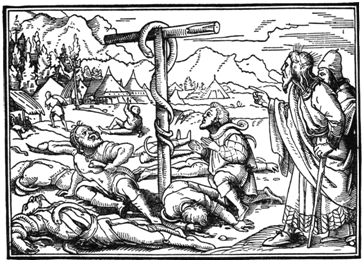The miracle of the bread and fishes caused the people to view Jesus as one of the prophets that Moses had spoken of in Deuteronomy 18:15, perhaps referencing the forthcoming Messiah of Israel, whom the people longed for to be their king, the fulfillment of the Davidic covenant. They wanted a king who would lead them to independence from Rome and restore them to a sovereign nation.
Jesus indeed was the Messiah, the King of Kings, but his plan was not to reign over the nation physically and politically. He came to reign in the hearts of individuals as their Redeemer who would restore them to fellowship with their Creator, just as Adam had experienced in the Garden of Eden before the fall. Jesus wants no part of being their political king. He sends the disciples across the sea and He retreats to the mountain for prayer (John 6:15). The people saw His POWER, but they missed His PURPOSE and PLAN.
The geography of the areas causes the Sea of Galilee’s exposure to sudden, violent storms as east winds bring cooler air down from the mountains to the east to replace the warmer air over the sea. The disciples experienced such a storm as they rowed to the other side. About three or four miles into the journey (i.e. about halfway across the sea), Jesus comes walking on the water to join them and immediately they were on the other side (John 6:16-21).
The next morning the crowd is seeking Jesus, but He is not to be found. They had seen the disciples leave with the boat, and camped along the shoreline between Bethsaida and Capernaum they would have seen Him had he walked back. So where did he go? They eventually find Him in Capernaum, but puzzled they ask “Rabbi, when did you come here?” (John 6:22-25).
Jesus understands what they want and confronts them that they are only here because they want more signs, the want more bread. They’re impressed with His POWER more so than the POINTS of His messages. He will use the opportunity to further discuss His PURPOSE. “Do not labor for the temporal food (bread), but the substance (Himself) that leads to eternal life.” He identifies Himself as the One whom God has sent. The crowd responds “Prove it. Do more signs!” (John 6:26-30). The crowd complains that Moses gave their ancestors manna to eat every day. Jesus only provided one meal. (John 6:31)
Jesus reminds them that Moses didn’t give the manna, God provided it. It was not about the acts of men then, and it was not about the acts of men now. The true bread is that which comes from heaven. (John 6:32-33). “Then gives us this bread,” the crowd demands. Jesus then issues his first of the I AM statements that John records. “I am the Bread of Life“. God told Moses that He was “I am”. Throughout the Hebrew Scriptures, Israel is reminded of His name and His character even further expounded . . . I am the Provider, I am Peace, I am your Shepherd, I am your Banner, I am your Sanctifier, I am your Righteousness. Jesus says “I am God” when He states “I am the Bread of Life”. Accept this truth and you will never hunger and never thirst. He’s talking spiritually here, not physically. He’s focusing on the eternal not the temporal. (John 6:35)
“Whoever comes . . . and whoever believes” ‘To come but not believe’ doesn’t cut it. That’s where these people were. They came for the wrong purpose with the wrong motive. They didn’t truly believe Jesus was who He said he was. They wanted the ecstasy of His power, but not the comfort of His purpose. They didn’t want to be accountable to what He might require of them. They didn’t believe what Jesus was selling (their righteousness) was available without the cost of their efforts (keeping the Law). It was more about them. To them, eternal life was a not a gift that Jesus could offer. They can’t really grab hold of what Jesus is offering. It’s too good to be true.
Likewise, some believe, but they don’t come. They intellectually understand the Gospel. They believe that Jesus was indeed God. But they still think they can earn their way . . . that they (in their egotism) can somehow satisfy God’s demand for perfect righteousness. They believe, but they don’t trust. Their trust is rooted in themselves. Unfortunately the gift that Jesus offers only becomes our when we reach out and accept it. We don’t get the blessing of a gift if we reject it and return it to the sender.
Jesus reminds the crowd of God’s gift of physical salvation in their nation’s history. When their ancestors were wandering in the wilderness, deadly snakes were killing the people. (Numbers 21:7-9) The Lord instructed Moses to make a bronze serpent and set it on a pole, with the realized promise that whoever looked at the serpent on the pole, would be cured of their ailment and would live. The Hebrew indicates this “pole” to be a standard or banner pole. Renowned 16th century artist Hans Holbein created a woodcut of how he envisioned the scene . . .

The pole was in the form of a cross! Israel was saved by looking to the cross! No medicine, no self-effort could save the Israelites physically from the poison of the serpents. Spiritually, no one can be saved from the poison of the serpent (resulting in our sin) though self effort. Eternal life is a gift of faith . . . trusting the I AM who hung on a pole.
“For this is the will of my Father, that everyone who looks on the Son and believes in Him should have eternal life, and I will raise him up on the last day.” (John 6:40)